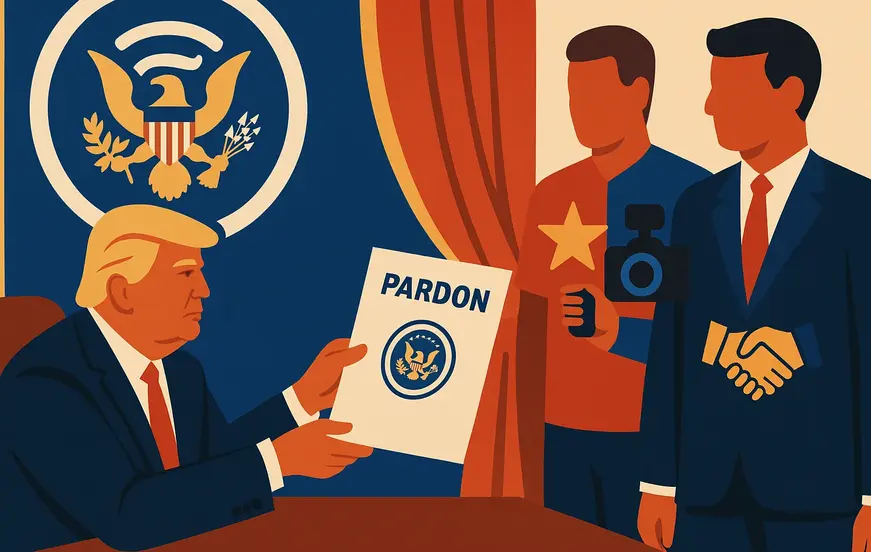Introduction: Presidential Pardon Power at Work
Trump Presidential Pardons have made headlines once again as former President Donald Trump issued a wave of clemency to several high-profile individuals, including reality television stars Todd and Julie Chrisley.
The Chrisleys had been convicted of defrauding banks out of more than $36 million and concealing millions from the Internal Revenue Service. Prosecutors described their financial misconduct as showing “astounding greed,” noting that the couple maintained extravagant spending habits throughout their fraudulent activities.
While serving their respective sentences—Todd was serving 12 years and Julie 7 years—the White House defended the pardons by characterizing the Chrisleys as “well-deserving Americans who were unfairly targeted.” This move comes after their daughter Savannah Chrisley publicly supported Trump, even speaking at the Republican National Convention.
Table of Contents
Reality TV Connections in Trump Pardons
The pardon of Todd and Julie Chrisley represents an unusual intersection between entertainment and presidential politics. Their daughter Savannah expressed shock at the news, saying “I still don’t believe it’s real.” The couple’s show Chrisley Knows Best gained popularity by showcasing their affluent lifestyle—the same lifestyle that prosecutors argued was funded through fraudulent means.
Despite their convictions for major financial crimes, the Trump administration determined they deserved clemency. The couple was serving a combined 19 years in prison before Trump directly addressed their case, saying “I wish them a good life.” This pardon follows a pattern of clemency for individuals with public platforms or connections to Trump’s media circles.
Learn more about presidential pardon powers
The pardons extend beyond just the reality TV stars. Scott Jenkins, a Virginia county sheriff who was convicted of accepting $75,000 in bribes, also received clemency just days before he was set to begin his prison term. Trump criticized Jenkins’ case as persecution by what he termed the “radical left.”
Another notable pardon went to Paul Pogue, a convicted tax evader whose mother reportedly attended a $1 million-per-head fundraiser with Trump at Mar-a-Lago. The administration defended this decision by claiming Pogue was targeted due to his family’s conservative politics.
Political Considerations and Patterns
Many critics suggest these pardons follow political patterns rather than justice-based considerations. Jenkins was characterized by the administration as being “persecuted,” while Pogue’s pardon came shortly after a significant fundraising event.
- Pardons for political allies and supporters
- Clemency for individuals who publicly praised Trump
- Relief for those with connections to Trump’s business or social circles
- Pardons following significant financial contributions to Trump-aligned causes
- Claims of “unfair targeting” by political opponents
Explore the history of controversial presidential pardons
Expanding Scope of Trump Pardons
January 6th Connections
The White House has indicated that more pardons may be forthcoming, particularly for individuals charged in connection with the January 6th Capitol events. According to reports, eleven rioters have submitted applications for full pardons to add Martin, the administration’s new pardon attorney.
This potential expansion into January 6th cases represents a significant escalation in the use of pardon power, as these cases touch directly on events that led to Trump’s second impeachment trial. The appointment of add Martin as the administration’s new pardon attorney signals a shift in how pardons may be evaluated going forward.
Reports indicate that Martin is expected to target other Biden-era prosecutions, potentially creating a pattern of using pardons to counteract the previous administration’s justice priorities.
⚖️ Explore Legal Careers on WhatJobs
Inspired by high-profile cases and presidential pardons making headlines?
Discover legal job opportunities across criminal law, public policy, corporate law, and government sectors.
WhatJobs connects you with in-demand roles in the legal field, from legal assistants to practicing attorneys—positions where justice and policy intersect.
👉 Browse top legal jobs now and take your next step in law and justice.Historical Context of Presidential Clemency
Presidential pardons have long been controversial, but scholars note that Trump’s use of this power differs from historical norms in several ways. Traditionally, presidents issue most pardons in their final months in office and rely heavily on recommendations from the DOJ Office of the Pardon Attorney.
Many historical pardons were for lower-profile cases not connected to the president. Presidents from both parties have issued controversial pardons, but rarely at this volume or with such clear connections to fundraising activities.
| President | Pardon Style | Notable Features |
|---|---|---|
| Trump | High-profile | Media figures, donors, allies |
| Obama | Commutations | Focus on drug offenses reform |
| Bush | Restrained | Limited use, followed DOJ process |
| Clinton | Last-minute | Controversial final day pardons |
Public and Legal Response
The latest round of Trump presidential pardons has generated significant reaction from various quarters. Legal experts question the message sent by pardoning high-profile financial criminals, while prosecutors in the Chrisley case expressed disappointment at seeing their work undone.
Victims of financial crimes by pardoned individuals have limited recourse once clemency is granted. Some Republican lawmakers have defended the pardons as addressing “overzealous prosecution,” while Democrats have criticized the pattern as rewarding loyalty over justice.
A former federal prosecutor noted, “When pardons appear connected to political support or financial contributions, it undermines public faith in equal application of the law.”
The judicial system’s response has been limited, as courts have historically been reluctant to question presidential pardon authority. However, some judges have expressed concern about the message sent when individuals convicted of significant financial crimes receive clemency, particularly when those crimes involved defrauding the public or government institutions.
Frequently Asked Questions
What limits exist on presidential pardon powers?
The Constitution gives presidents broad authority to grant Trump presidential pardons for federal crimes. However, these powers don’t extend to state-level offenses or civil cases. Presidents can’t pardon someone for crimes not yet committed, and pardons don’t erase the record of conviction.
How many Trump presidential pardons were issued during his term?
During his presidency, Trump issued 143 pardons and 94 commutations. Many Trump presidential pardons were granted to political allies, campaign donors, and celebrities, following a pattern distinct from previous administrations.
Do Trump presidential pardons restore all rights to recipients?
While Trump presidential pardons forgive the federal crime and release recipients from punishment, they don’t automatically restore all civil rights. Some rights, like gun ownership or voting privileges, may require additional state-level restoration processes.
Can Trump presidential pardons be revoked once granted?
Once a Trump presidential pardon has been delivered and accepted by the recipient, it generally cannot be revoked. Courts have consistently upheld that presidential pardons, once completed, are permanent acts of executive clemency.




